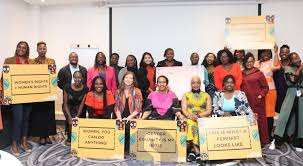
The 16 Days of Activism against Gender-Based Violence (GBV) is a global campaign designed to eliminate violence against women and girls.
Running annually from November 25 to December 10, the campaign highlights the severe impacts of gender-based violence.
According to the World Health, Organisation, the year 2023 marked an important shift in the narrative, as
the campaign emphasised that ending violence against women is not only a moral
imperative but also a global necessity.
The theme for this year's campaign, "Ending violence against women is possible, but only if we act together, now," underscores the urgent need for collective action to address the widespread issue of GBV.
This campaign, originally started by the Centre for Women's
Global Leadership in the 1990s, has since become a worldwide movement.
The campaign is now
known as the Global 16 Days Campaign, a crucial time when governments,
organisations, communities, and individuals come together to focus on ending
violence against women and girls.
The scope and urgency of the issue
The WHO notes that violence against women is a pervasive issue that cuts across
all cultures and nations, causing significant physical, emotional, and societal
harm.
"Risks and challenges to access care increase even more for women and girls living in humanitarian emergencies," the WHO says.
Systemic inequalities
often fuel this violence, and crises such as armed conflicts, natural
disasters, and public health emergencies exacerbate these risks.
Women and girls in humanitarian settings face heightened
threats, with limited access to essential care services.
The 16 Days of Activism campaign highlights this dire
situation, emphasising the critical need for urgent action to address GBV in
crisis situations.
The physical and psychological toll of GBV is profound.
Survivors often suffer from physical injuries, unintended pregnancies, sexually
transmitted infections, depression, and post-traumatic stress disorder.
Despite the severity of the impacts, many survivors face numerous barriers to accessing care.
Healthcare workers are often the first, and sometimes the only, point of contact for survivors.
The provision of safe, timely, and confidential care—such as medical treatment, first-line support (LIVES), and referrals to essential services—is vital for survivors' well-being and survival.
The role of health systems and humanitarian action
Addressing GBV in humanitarian settings remains a focal point of the campaign.
In these contexts, the prevalence of violence often
rises, requiring stronger responses from health systems and other sectors.
The WHO has played a crucial
role in developing tools and guidance, training healthcare workers, and
deploying GBV experts to emerging crises.
These efforts ensure that survivors in high-risk settings can access the support and services they need.
This year’s campaign underscores the importance of
collective action. The key message is clear: "GBV is not just a women’s
issue, it’s a human rights issue."
This message has been embraced by various sectors across
Kenya, and the conversation around GBV has become more inclusive.
Civil society organisations (CSOs), media houses, independent commissions, and even corporate companies have joined the discussion.
"It has been radically effective. We have seen
recognition from all sectors in the country, including independent
organizations such as the National Land Commission and the National Gender
Equality Commission. Even corporate companies are highlighting the issues of
GBV," Tatyana Kendi from the Kenya Human Rights Commission (KHRC) said.
In Kenya, the 16 Days of Activism have sparked wider public
discussions. People from all sectors and backgrounds, regardless of gender, are
engaging in the conversation about GBV.
This is a positive shift, as it helps to break down the
barriers of silence that have long surrounded this issue.
"People have come to realize that GBV is not a women's
rights issue, but a human rights issue," Kendi said.
"This has brought together people from all walks of
life, from young boys and girls to men and women, speaking out on the
challenges they face daily in regards to gender-based violence."
Engaging communities and creating male champions
One of the crucial steps in combating GBV is to engage
communities, particularly men and boys.
The KHRC has been leading efforts to create "male
champions" who advocate for the end of gender-based violence.
These initiatives focus on educating and engaging young boys
and men in the fight against GBV, ensuring that the mentality surrounding
violence is addressed from an early age.
"By involving young boys and older men, we can shift
the perspective on GBV. It is not always male against female. It can be female
against male, male against male, or female against female," she said.
These efforts aim to create a broader understanding of the
issue and foster empathy for survivors of all genders.
Promoting access to justice for survivors: Alongside awareness raising, the KHRC has also been active
in promoting access to justice for GBV survivors.
Through a partnership with the UNDP, the KHRC has been
working on projects to ensure that survivors receive the legal and psychosocial
support they need.
This initiative has been running for two years and has seen
tangible success stories.
"Together with UNDP, we’ve promoted access to justice
for GBV survivors, which has been one of the key pillars of our work,"
Kendi said.
Way forward: Beyond the 16 days
The 16 Days of Activism serves as a vital call to action for
everyone—governments, organisations, and individuals—to take a stand against
gender-based violence.
The key messages of the campaign emphasise that ending violence
against women and girls is not just a possibility, but an essential step toward
creating safer, healthier, and more equitable communities. The Days is a
reminder that it is our collective responsibility to act, and act now, to
ensure a future free from violence.
“Ending violence against women and girls is not only
possible; it is essential for creating a world where everyone can live with
dignity and respect.”
“This global campaign shows us that together, we can build a future where gender-based violence no longer holds power," she said.



.jpg&w=3840&q=100)








